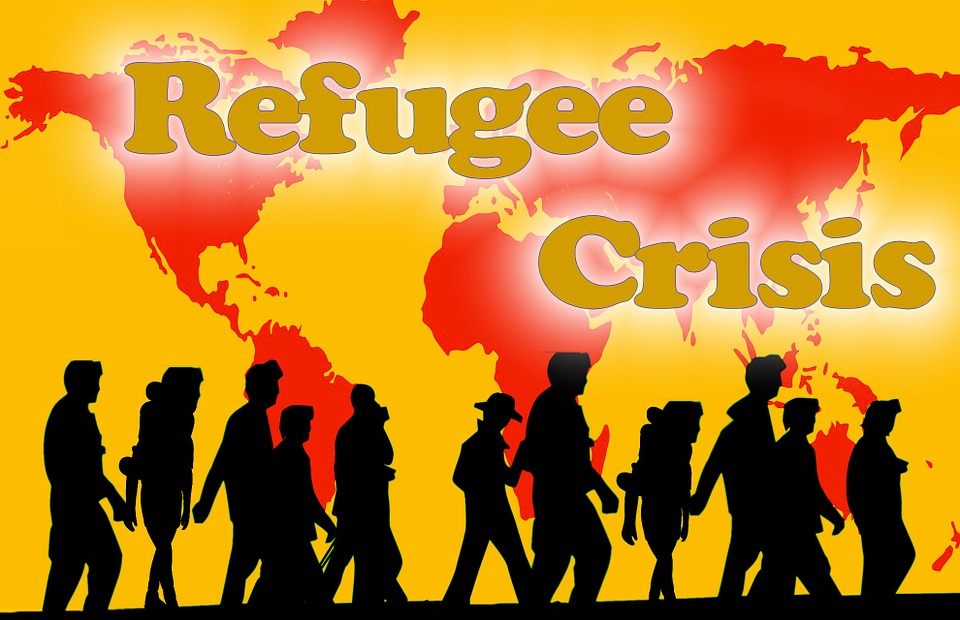On the 11th of April 2017, Professor Michela Ceccorulli of the University of Bologna delivered an important speech on the issue of migration, European Union Asylum and migration policies and the Visegrad states reaction. The heavy burden of the refugee crisis carries two South East European countries Italy and Greece, which attract high flows of migrants from the beginning of the crisis.
The European Union has launched a unilateral military humanitarian operation during 2013-2014 that contained serious external and internal contestations. The Union felt compelled to act by 2013, with FRONTEX ( the agency responsible for the external EU borders) initiating humanitarian operations to coordinate the flows of migrants coming from the Mediterranean to European territories. Also, the operation Mare Nostrum has achieved some great results, however, is costly it has been replaced by Triton Operation, a border-control rather than search and rescue operation. The failure of the operations mentioned above to commit to the mission of rescuing migrants raise an important criticism towards the EU, the inability to be a vocal agent in coordinating migration policies among Member-states, apart from assisting to several NGOs that are currently providing humanitarian aid to refugees from and across the Mediterranean sea.
The refugee crisis has revealed the weaknesses of the Union in implementing and executing policies that would deal with the issue at its core. Whether EU is to blame or not is debatable since Member-states have absolute authority in deciding the distribution of migration flows and the power to refuse to welcome migrants in their territories, even though the Union has launched a number of regulations to redistribute migration flows and introduce a Common Asylum and Migration system. Therefore, are the Member-states that seem reluctant to intervene to blame for the failure of EU migration policy?

The statistics reveal an awful and disturbing truth, only in 2015, 750-900 migrants have died in the Mediterranean sea, whereas migration flows are on the rise. The deteriorating conditions (instability and violence) in the countries of origins of first asylum seekers generates a total chaos at the European borders as thousands of migrants and not refugees or asylum seekers are crossing the Mediterranean. The geopolitical changes in the Middle East and African countries that closed off alternative destinations e.g. Libya, Jordan, and Lebanon burden Europe with an overflow of migrants, testing the ability of the Union to react to external crises. During 2015, 1.1 million migrants arrived in the EU, half of them coming from Syria and landing in Greece.
Schengen Agreement is in danger of collapsing as some of its members are demanding re-establishment of border controls, the Dublin Regulation is proven to be ineffective; hence Europe is facing an existential crisis since on the one hand, the EU chamber for human rights includes the right to asylum and on the other, policies targeting resettlement of asylum seekers are against the international law. The lack of opportunities for integration to European states (the right to work and enroll) is hardening the situation. According to the Geneva Convention, a refugee is already qualified as the asylum seeker since she/he is fleeing from adverse circumstances in the origin countries e.g. violation of fundamental human rights, therefore a refugee is someone who requests international protection.
The complexities of a Common Asylum system and the constant flows of migrants and asylum seekers pushed the EU to externalize the causes of instability and place the challenge elsewhere, signing an agreement with Turkey based on 1-1 resettlement deal, where all irregular migrants would be sent back to Turkey from Greece and in an exchange the EU would increase the resettlement of refugees fleeing from Syria and residing in Turkey. Most critics and observers are questioning the effectiveness of the agreement between EU and Turkey in controlling non-documented migrants residing in Europe.
The challenge is to regulate migration flows and deal with undocumented migration if Europe wishes to implement and coordinate joint initiatives and revise the ineffective Common Asylum System. So far, EU common solidarity system and relocation plan have faced serious resistance by Member-states who claim security of external and internal borders and at times evoke the issue of terrorism when establishing policies of protectionism. Therefore, given the failure to coordinate redistribution of migration flows among Member-states, the EU has turned to third countries seeking cooperation to stop the flows towards EU. The security operations target stability in origin countries as EU is expanding its foreign policy.
Nevertheless, new legal migration policy depends on the domestic policies of the Member-states. Even though the relocation system contains binding decisions in the form of emergency proposals, the objective of relocating 40.000 migrants from Italy and Greece over a period of two years has not been realized yet. One should not forget that sharing responsibility is based on the size of the population, total GDP rates, average number of asylum applications over the previous four years and unemployment rates of a country to sustain the flows of asylum seekers and migrants. The main beneficiaries are those who are classified as in clear need of international protection, recognizing the asylum status of people coming from Syria, Eritrea, and Iraq. The quotas distribution system has divided EU, mainly the four Visegrad countries and the rest of the Europe as they are willing to provide economic aid but not practically getting involved in the reform of the asylum system, whereas the EU considers the relocation system an emergency issue.
The alternative proposal is flexible solidarity but it is disputable if this method could potentially assist in controlling illegal migration and migration flows. Greater border control is something that Member-states could put their joint efforts on whereas the dangerous linkage between migration and terrorism is fuelling public debate in V4 countries, allowing opportunists to take advantage of the situation and promote anti-European and anti-migration agenda. However the message is clear, the need to reform the Common Asylum System is crucial for the survival of EU but blaming the Visegrad countries for the failure of EU migration policy is not turning the tables on either side.
Kyriaki Kyriakou
Department of Political Science
University of Bologna, Italy.
